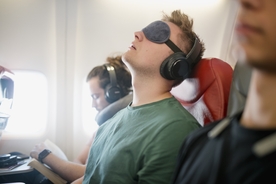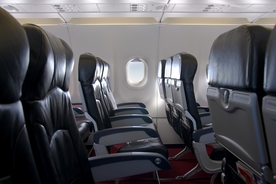There's nothing more exciting than an upcoming trip. But whether you're jetting away to some exotic locale, or taking a mini-break in a picturesque European city, one thing is for sure: the travelling portion of your holiday is seldom enjoyable.
Sure, the top one per cent are able to travel in luxury, on the other side of the grey curtain where they are served cocktails and gourmet meals. Us scrimpers and savers, on the other hand, have to contend with knocking our knees against table trays, eating food with plastic cutlery, and standing in never-ending bathroom queues.
But in one regard, we're all equal. Regardless of how great your fortune is or how influential you are, we all have to deal with the toll that long haul flights take on our body, and it extends far beyond just jet lag...
Aside from dealing with crying children and subpar airplane food, those who fly long-haul can expect it to take a toll on their health, and in some cases it can even be serious.
Your chances of getting deep vein thrombosis are tripled from taking long-haul flights. A study found that women, especially those who take the contraceptive pill, and people who are particularly tall, short and overweight are most at risk.
It makes sense - if you're cramped in a confined space for over eight hours - you can expect to be at greater risk of blood clots. It can be prevented by a few simple measures, however. Ensure that you're moving about the cabin as often as possible, and invest in properly fitted flight stockings - which help speed up the flow of blood in the veins.
We should also ensure that we're hydrated when cruising the skies. This is because humidity on planes can get as low as 10 per cent, which is incredibly low. In fact, there are times when the humidity of the world's deserts are significantly higher than that.
Alcohol should accordingly be avoided. Not only does it dehydrate you, but it also acts as a diuretic - meaning that even more fluid is passed out of the body as urine. If you're still intent on getting through the G&T's, however, try to balance it out with plenty of water.
The lack of humidity also dries out your mucus glands, meaning that it's easier to counteract someone else's cold or flu.
It's common knowledge that airplanes are hotbeds for bacteria and viruses. They reside all over the armrests, in the seat pockets, the toilet cubicles, and hover in the air, just ready to pounce.
Microbiologists have tested planes and discovered that germs certainly are commonplace, and can survive for hours or days after the passenger who brought them on board has departed. As well as being responsible for the common cold and flu, these bugs can cause everything from stomach upsets to skin diseases.
But, there is some good news. The theory that the air circulation systems within planes recycle all the germs and bacteria found inside is a bit of a myth, as they take in air from outside as well as re-circulating air from within.
Well, if you're not rethinking your 12 hour flight now, you better begin hydrating, stat.

.jpg_ekMAXQ?tr=h-184)



